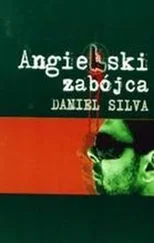Daniel Silva - Prince of fire
Здесь есть возможность читать онлайн «Daniel Silva - Prince of fire» весь текст электронной книги совершенно бесплатно (целиком полную версию без сокращений). В некоторых случаях можно слушать аудио, скачать через торрент в формате fb2 и присутствует краткое содержание. Жанр: Шпионский детектив, на английском языке. Описание произведения, (предисловие) а так же отзывы посетителей доступны на портале библиотеки ЛибКат.
- Название:Prince of fire
- Автор:
- Жанр:
- Год:неизвестен
- ISBN:нет данных
- Рейтинг книги:5 / 5. Голосов: 1
-
Избранное:Добавить в избранное
- Отзывы:
-
Ваша оценка:
- 100
- 1
- 2
- 3
- 4
- 5
Prince of fire: краткое содержание, описание и аннотация
Предлагаем к чтению аннотацию, описание, краткое содержание или предисловие (зависит от того, что написал сам автор книги «Prince of fire»). Если вы не нашли необходимую информацию о книге — напишите в комментариях, мы постараемся отыскать её.
Prince of fire — читать онлайн бесплатно полную книгу (весь текст) целиком
Ниже представлен текст книги, разбитый по страницам. Система сохранения места последней прочитанной страницы, позволяет с удобством читать онлайн бесплатно книгу «Prince of fire», без необходимости каждый раз заново искать на чём Вы остановились. Поставьте закладку, и сможете в любой момент перейти на страницу, на которой закончили чтение.
Интервал:
Закладка:
At the checkpoint a Shabak man stood among the IDF soldiers. As Yaakov approached, the Shabak man murmured a few words to the soldiers and the Volkswagen was allowed to pass without inspection. Yaakov, clear of the checkpoint, raced along the moon-washed road at high speed. Gabriel glanced over his shoulder and saw a pair of headlights. The lights floated there for a time, then receded into the night. Yaakov seemed to take no notice of them. The second car, Gabriel suspected, belonged to a Shabak countersurveillance team.
A sign warned that Ramallah lay four kilometers ahead. Yaakov turned off the road, onto a dirt track that ran through the bed of an ancient wadi. He doused his headlamps and navigated the wadi with only the amber glow of his parking lights. After a moment he brought the car to a stop.
“Open the glove box.”
Gabriel did as he was told. Inside was a pair of kaffiyehs.
“You’ve got to be kidding.”
“Cover your face,” Yaakov said. “All of it, the way they do.”
Yaakov, in a practiced motion, bound his head in the kaffiyeh and tied it at his throat, so that his face was concealed except for a thin slit for his eyes. Gabriel did the same. Yaakov started driving again, plunging along the darkened wadi with both hands wrapped around the wheel, leaving Gabriel with the uncomfortable feeling he was seated next to an Arab militant on a suicide run. A mile farther on, they came to a narrow paved road. Yaakov turned onto the road and followed it north.
The village was small, even by West Bank standards, and gripped by an air of sudden desertion-a collection of squat, dun-colored houses crouched around the narrow spire of a minaret, with scarcely a light burning anywhere. In the center of the village lay a small market square. There were no other cars and no pedestrians, only a flock of goats nosing amid fallen produce.
The house where Yaakov stopped was on the northern edge. The window facing the street was shuttered. One of the shutters hung aslant from a broken hinge. A few feet from the front door was a child’s tricycle. The bike was pointed toward the door, which meant the meeting was still on. Had it been pointed in the opposite direction, they would have been forced to abort and head for the backup location.
Yaakov snatched an Uzi submachine gun from the floorboard and climbed out of the car. Gabriel did the same, then pulled open the rear passenger-side door, just as Yaakov had instructed. He turned his back to the house and watched the street for any sign of movement. “If anyone approaches the car while I’m inside, shoot in their direction,” Yaakov had said. “If they don’t get the message, put them on the ground.”
Yaakov hurdled the tricycle and drove his right foot against the door. Gabriel heard the crack of splintering wood but kept his eyes trained on the street. From inside came the sound of a voice shouting in Arabic. Gabriel recognized it as Yaakov’s. The next voice was unfamiliar to him.
A light appeared in a nearby cottage, then another. Gabriel released the safety on his Uzi and slipped his forefinger inside the trigger guard. He heard footfalls behind him and turned in time to see Yaakov leading Arwish through the broken door, hands in the air, face shrouded by a black hood, an Uzi pressed to the back of his head.
Gabriel turned his gaze once more toward the street. A man, dressed in a pale gray galabia, had stepped outside his cottage and was shouting at Gabriel in Arabic. Gabriel, in the same language, ordered him to stay back, but the Palestinian advanced closer. “Shoot at him!” Yaakov snapped, but Gabriel calmly held fire.
Yaakov shoved Arwish headlong into the back of the car. Gabriel scrambled in after him and drove the informant toward the floor. Yaakov ran around the front of the car to the driver’s side door, pausing long enough to spray a volley of rounds a few yards from the feet of the Palestinian villager, who scurried back into the shelter of his house.
Yaakov jumped behind the wheel, then reversed down the narrow street. Reaching the market square, he turned around and sped through the village. The gunfire and the roaring of the car engine had alerted the villagers to trouble. Faces appeared in windows and doorways, but no one dared challenge them.
Gabriel kept watch out the rear window until the village vanished into the darkness. A moment later Yaakov was once again racing along the rutted wadi, this time in the opposite direction. The collaborator was still pressed to the floor, wedged into the narrow space between the backseat and the front.
“Let me up, you jackass!”
Gabriel pressed his forearm against the side of the Arab’s neck and subjected his body to a rough and thorough search for weapons or explosives. Finding nothing, he pulled the Arab onto the seat and tore away the black hood. A single eye glared malevolently back at him-the eye of Yasir Arafat’s translator, Colonel Kemel.
The city of Hadera, an early Zionist farm settlement turned drab Israeli industrial town, lies on the Coastal Plain halfway between Haifa and Tel Aviv. In a working-class section of the city, adjacent to a sprawling tire factory, stands a row of wheat-colored apartment buildings. One of the buildings, the one nearest the factory, stinks always of burning rubber. On the top floor of this building is a Shabak safe flat. For most officers it is a meeting place of last resort. Yaakov actually preferred it. The acrid smell, he believed, lent an air of urgency to the proceedings, for few men who came here wished to linger long. But then Yaakov was driven by other ghosts. His great-grandparents, Russian Jews from Kovno, had been among the founders of Hadera. They had turned a worthless malarial swamp into productive farmland. For Yaakov, Hadera was truth. Hadera was Israel.
The flat was devoid of comfort. The sitting room was furnished with folding metal chairs, and the linoleum floor was buckled and bare. On the kitchen counter stood a cheap plastic electric kettle; in the rust-stained basin a quartet of dirty cups. Mahmoud Arwish, alias Colonel Kemel, had turned down Yaakov’s rather disingenuous offer of tea. He had also requested that Yaakov leave the lights off. The neatly pressed uniform he’d been wearing that morning at the Mukata had been replaced by a pair of gabardine trousers and a white cotton shirt, which glowed softly in the moonlight streaming through the window. Between the two remaining fingers of his right hand rested one of Yaakov’s American cigarettes. With the other hand he was massaging the side of his neck. His single eye was fixed on Gabriel, who had forsaken his folding chair and was seated on the floor with his back propped against the wall and his legs crossed before him. Yaakov was a formless shadow against the window.
“I see you’ve learned a thing or two from your Shabak friend,” Arwish said, rubbing his jaw. “They have a reputation of being good with their fists.”
“You said you wanted to see me,” said Gabriel. “I don’t like when people ask to see me.”
“What did you think I was planning to do? Kill you?”
“It’s not without precedent,” Gabriel replied calmly.
Shabak agents, he knew, were at their most vulnerable while meeting with assets from the other side. In recent years, several had been killed during meetings. One had been hacked to death with an ax in a Jerusalem safe flat.
“If we’d wanted to kill you, we’d have done it this morning in Ramallah. Our people would have celebrated your death. Your hands are stained with the blood of Palestinian heroes.”
“Celebration of death is what you’re good at these days,” Gabriel replied. “Sometimes it seems to be the only thing. Offer your people something instead of suicide. Lead them instead of following the most extreme elements of your society. Build something.”
Читать дальшеИнтервал:
Закладка:
Похожие книги на «Prince of fire»
Представляем Вашему вниманию похожие книги на «Prince of fire» списком для выбора. Мы отобрали схожую по названию и смыслу литературу в надежде предоставить читателям больше вариантов отыскать новые, интересные, ещё непрочитанные произведения.
Обсуждение, отзывы о книге «Prince of fire» и просто собственные мнения читателей. Оставьте ваши комментарии, напишите, что Вы думаете о произведении, его смысле или главных героях. Укажите что конкретно понравилось, а что нет, и почему Вы так считаете.











